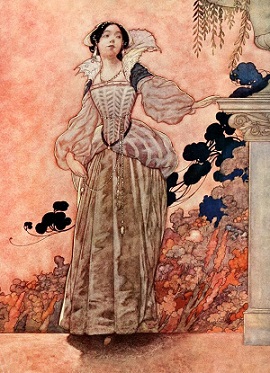| directory |
| home | contact |
|
|||||||||||||||
| search | |||||||||||||||
Notessickly (4) ] Love as a sickness is the primary motif of the sonnet. Notice Shakespeare's word choices: fever (1), disease (2), ill (3), physician (5), prescription (6), physic (8), death (8), and cure (9). Also note the more subtle word play with physician and physic. The focus on illness might be connected to venereal disease. Note Sonnet 144, "Till my bad angel fire my good one out" (14). Many critics believe this is a direct reference to a sexually transmitted disease.the physician to my love (5) ] The poet's reason acts as his doctor, advising him on the proper course of action. In the next line we see that death is not a remedy which the physician will allow the poet. approve (7) ] Find by experience. black (14) ] A play on the dark complexion of the poet's mistress. Shakespeare's scathing attack upon the morality of his mistress exemplifies their tumultuous and perplexing relationship. The three quatrains outline the poet's inner struggle to cope with both his lover's infidelity and the embarrassing self-admission that he still desires her to gratify him sexually, even though she has been with other men. The poet yearns to understand why, in spite of the judgment of reason (5), he still is enslaved by her charms. Confused by his own inexplicable urges, the poet's whole being is at odds with his insatiable "sickly appetite" (4) for the dark lady. He deduces in the final quatrain that he surely must be insane, for he calls his mistress just and moral when she obviously is neither. Not until later sonnets (150-1) do we see a change of tone and a cool-headed acknowledgment of the recklessness of the whole affair. In Sonnet 151, the poet admits that he cannot continue the relationship because it betrays his "nobler part" (6) i.e. his soul, and in Sonnet 152 we are witness to the end of the affair. Is Sonnet 147 autobiographical? Did Shakespeare really have an affair with a raven-haired seducer? Critics are divided on this matter, and, until some new documents are uncovered, we shall never know the truth. Attempts have been made to solicit possible historical candidates for the role of the dark lady, based on their likely association with Shakespeare. The most famous contenders are Mary Fitton, lady-in-waiting to Queen Elizabeth; Lucy Morgan, a brothel owner; and Emilia Lanier, the mistress of Lord Hunsdon, patron of the arts. I'll leave you with a skeptic's view of the autobiographical nature of the sonnets: Every sonneteer of the 16th century, at some point in his career, devoted his energies to vituperation of a cruel siren....In Shakespeare's early life the convention was wittily parodied by Gabriel Harvey in "An Amorous Odious sonnet entitled The Student's Loove or Hatrid, or both or neither, or what shall please the looving or hating reader, either in sport or in earnest, to make of such contrary passions as are here discoursed". The Dark Lady of Shakespeare's sonnets may therefore be relegated to the ranks of the creatures of his fancy. It is quite possible that he may have met in real life a dark-complexioned siren, and it is possible that he may have fared ill at her disdainful hands. But it was the exacting conventions of the sonneteering contagion, and not his personal experiences or emotions, that impelled Shakespeare to give the dark lady of his sonnets a poetic being" (Sidney Lee, quoted in the Alden edition, p. 359). How to cite this article:______ Even More... |

More to Explore_____
_____ |
©1999-2021 Shakespeare Online. All Rights Reserved.
 "Of the countless editions of the works of Shakespeare that show a frontispiece likeness of the poet, it is a singular fact that by far the greater number favour the 'Chandos' portrait. The face and features of Shakespeare as 'imaged' in that portrait are those with which his readers are probably most familiar. It is not easy to account for this, since the Chandos Portrait is certainly not the first in point of genuineness, whatever may be its degree of artistic merit. Possibly it satisfies more fully the popular ideal of the likeness of a great creative poet than does the bust or print just referred to. Be that as it may, the 'Chandos ' portrait, for various reasons, more than justifies its being kept in the custody of the nation as a very rare and valuable relic of its greatest dramatist." Alexander Cargill.
"Of the countless editions of the works of Shakespeare that show a frontispiece likeness of the poet, it is a singular fact that by far the greater number favour the 'Chandos' portrait. The face and features of Shakespeare as 'imaged' in that portrait are those with which his readers are probably most familiar. It is not easy to account for this, since the Chandos Portrait is certainly not the first in point of genuineness, whatever may be its degree of artistic merit. Possibly it satisfies more fully the popular ideal of the likeness of a great creative poet than does the bust or print just referred to. Be that as it may, the 'Chandos ' portrait, for various reasons, more than justifies its being kept in the custody of the nation as a very rare and valuable relic of its greatest dramatist." Alexander Cargill.